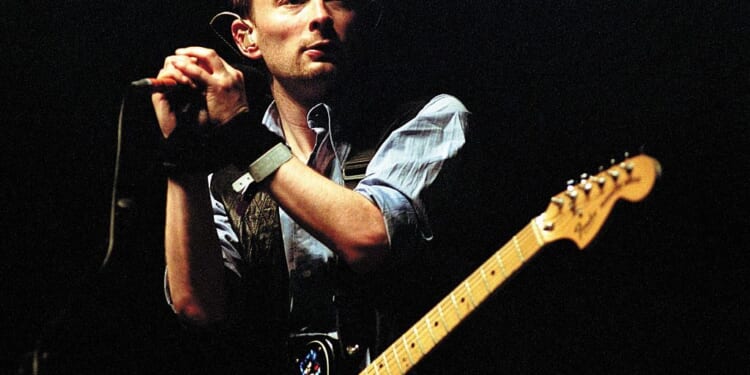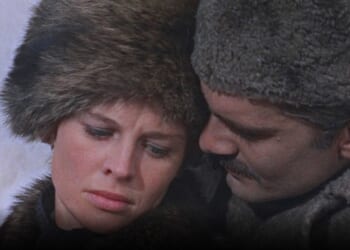As Radiohead arrive at the O2 this week on what is effectively a greatest hits tour, they find themselves in a novel and precarious position. For decades, the Oxford quintet reflected the zeitgeist so perceptively that it felt, at times, that they were the zeitgeist. An alienated band for alienated times. While Oasis, their near-contemporaries, looked to the past, Thom Yorke’s cut-up lyrics for The Bends, OK Computer and Kid A looked to the future.
Only, now we are in that future and all their prophecies have come to pass — the Ice Age coming, the next world war, the four-minute warning, the tanks rolling in — Radiohead seem curiously out of sync. Having been vocally political for years, they have found themselves under attack for their position, or lack thereof, on Gaza and Israel. Last year, Yorke was heckled into briefly abandoning a solo live performance in Melbourne by a pro-Palestinian protester and has recently been taken to task by Roger Waters, formerly of Pink Floyd, for daring to play in Israel. The five members of Radiohead have meanwhile revealed that their differing stances on the conflict have nearly torn the band apart. Jonny Greenwood is married to Israeli artist Sharona Katan and has performed with Israeli musician Dudu Tassa, though UK gigs were cancelled after pressure from the BDS movement.
It’s possible to see the band’s determination to relive past glories as evidence of mature disagreement. But still, here’s another striking contrast. While the seemingly irreconcilable Gallagher brothers were able to put aside their differences earlier this summer, Radiohead’s lap of honour comes with rancour and sniping. As prophets of the disaffected, they have long evaded criticism. But nothing lasts forever.
It’s possible to see Radiohead’s current predicament as a mimetic crisis, to use René Girard’s term. This is when groups of people are faced with problems and contradictions that are insurmountable within the terms of their worldview. Rather than confront these realities, the group establishes consensus, catharsis and a purging of responsibility through the sacrifice of a scapegoat. Girard called this the “surrogate victim mechanism” (which already sounds like a great Radiohead B-side). Faced with apocalyptic horrors, unable to hold the perpetrators to account, we turn to surrogates to punish, which is a driving force of recent atrocities in the Middle East and the response in the West. It results in the transference of animus from the butchers onto, for example, musicians, writers and artists, complicit and supposedly equivalent in their silence. Without proportion, the lines of culpability are made to blur. Human beings operate according to mimetic desire in Girard’s view; they look to each other to find out what to believe and wish for. A generation had looked to Radiohead. Who better then to have as a scapegoat? The larger the sacrifice, the greater the coming harvest.
When Radiohead first emerged in 1993, grunge was becoming a dead end, and a generation was searching for something more. Viewed as a one-hit wonder for their anthem “Creep”, Radiohead faced an existential crisis — but they had a crucial advantage over their American counterparts. Their focus was on disaffection rather than passive suffering or self-destruction. Disaffection was active, resistant, and could be approached with a much more complex musical palette. It could be used to create a portrait of an entire civilization rather than simply a tortured self.
The leap in quality from their underwhelming debut Pablo Honey (1993) to The Bends (1995) — via the abrasive, deliberately uncommercial My Iron Lung EP (1994) — was enormous. With The Bends, Radiohead ascended to a lofty plateau that they have occupied for almost 30 years, longer than just about any comparable rock band.
But Radiohead have never settled into a comfort zone in the manner of more well-adjusted bands, like U2 or Coldplay, say. The disaffection, which attracted hordes of No Logo-reading Gen Xers, was not a performance. The discomfort was real (see the 1998 documentary Meeting People Is Easy).
While mistrustful of the music industry, Radiohead trusted their fans to accompany them into weirder challenging territory, from OK Computer (1997), the perfect encapsulation of pre-Millennial anxiety, to the daring electronic ruptures of Kid A (2000) and the unfairly overshadowed Amnesiac (2001). These were not so much attempts to purge the normies accrued by The Bends as a conscious effort to kill the normie within. This was territory few fans expected or even knew existed.
In the years that followed, the only real musical misstep has been the curiously incomplete and claustrophobic The King of Limbs (2011). But with hindsight, it was the band’s most overtly political album, Hail to the Thief (2003), released in the shock and awe phase of the so-called War on Terror, its title an allusion to George W. Bush’s stolen election, that opened Pandora’s box.
Radiohead’s greatest lyrical strength has always been collage. While your Bonos and Bruce Springsteens were bogged down in glaringly inauthentic authenticity, hokey storytelling and self-righteous preaching, Radiohead found a way to be obliquely political, reflecting society back to itself like a fractured mirror. Collage was both the medium and the message, Yorke’s lyrical style anticipating the bombardments of disparate images and data that count now as daily life. It was also replicated in the art style Yorke developed with Stanley Donwood for Radiohead’s cover art (currently on display at the Ashmolean in Oxford).
The use of collage meant Radiohead could avoid literalism and the moralism that often accompanies it. It also gave them a freedom to juxtapose divergent subjects and tones together. One of the clichés associated with the band is their focus on technology — the depressed airport tropes. But there are other lyrical tics that are just as prevalent. One is Yorke’s use of the archaic, whether from the religious past (“red crosses on wooden doors’” the Holy Roman Empire) or more recent ephemera (rag and bone men, toothpaste adverts). Medieval images recur, from “heads on sticks” to omens in the night skies, implying that for all our modern appearances we have not changed much from the days of the pillories and gallows. Fragments of bedtime stories and nursery rhymes are scattered throughout – the Cheshire Cat, Peter Pan, Henny Penny, the Boney King of Nowhere from Bagpuss — adding to the feeling of menace and stolen innocence. The distance from childhood dreams to “a pig in a cage on antibiotics” is damning.
Yorke is also adept at recontextualising managerial speak to sinister effect: “Your services are not required,” “I will stop at nothing,” etc. On “Electioneering” from OK Computer, the juxtapositions of “Riot shields, voodoo economics / It’s just business, cattle prods, and the IMF” neatly encapsulate the anti-capitalism of that era. But it is still the poetic and enigmatic that truly stirs the heart, as in the anti-war anthem “Harry Patch (In Memory Of)” inspired by one of Britain’s last surviving veterans from the First World War: “I’ve seen devils coming up from the ground…”
The cut-up style gave them space to be elusive and allusive and by critiquing everything, Radiohead may have felt immune to critique themselves. But the abyss has eyes too.
From its title onwards, Hail to the Thief felt too on the nose. It was partially understandable given the social context of the time — the invasion of Iraq was being launched despite widespread public opposition in the UK. It was not a time when subtlety felt appropriate and Yorke’s writing duly took on a more direct and overt approach. This resulted in powerful moments such as the Orwellian punk of “2+2 =5” and the later solo track “Harrowdown Hill” about the hounding and untimely death of the weapons expert David Kelly.
But the album’s most haunting moments are still notably indirect. “I Will” was inspired by the horrific massacre of hundreds of women and children by the US Air Force, whose stealth bombers directed two missiles down into the Amiriyah bomb shelter during the Gulf War, searing the images of victims onto the walls. “I will lay me down / In a bunker underground / I won’t let this happen to my children.” The song ends as a lullaby, chilling partly because of what it leaves out. It is one of their most delicate and devastating tracks and proof that you must first move the listener before you can convince them.
But one of the problems of assuming a political platform is that, like the Mafia, you can’t retire. You have to be perpetually engaged and anything less than constant, dutiful service can be interpreted as signs of callous indifference towards the world’s endless atrocities. With Hail to the Thief, there was more of a sense of the lyrics being cut-up lectures, with a distancing of the evildoer as “other”. But to be convinced of one’s own benevolence is to render oneself vulnerable, to blind oneself, and Radiohead have not been the only ones rattled by attacks from their own (see also Zadie Smith and Sleaford Mods, both pilloried for being insufficiently pro-Palestinian). At some point, all of us arrive at a moment when we feel like time travellers in our own lives, thrust into a future that makes little sense, still seeing the world in parameters that changed twenty years ago.
“One of the problems of assuming a political platform is that, like the Mafia, you can’t retire.”
And these backlashes against our former righteous heroes are all taking place in the discourse chambers of the West, full of status-driven grift, bad faith, in-group policing, struggle sessions and stolen valour. Meanwhile the real victims of Iraq, Afghanistan, Gaza, Israel and elsewhere are buried in the earth or piecing their shattered lives back together.
Then again, in this sense, perhaps Radiohead never really did lose their ability to mirror the zeitgeist. That is both their gift and their curse. They predicted much of where we are today: the unwinnable trial of “Burn the Witch” (“if you float you burn”); the reflexive paranoia of “2+2=5” (“don’t question my authority or put me in a box”); even the mocking of the centrist in “Packt Like Sardines in a Crushd Tin Box” (“I’m a reasonable man, get off my case”). The villain in Radiohead songs was always conveniently someone else. We never imagine that the problem might lie within us and those we elevate.
It is hard to imagine living through an apocalypse — but there are children in the Middle East, Afghanistan and Yemen who are afraid of the sky, and people mutilated in Cambodia, Vietnam and elsewhere, as a consequence of the decisions of our politicians. It is paralysing to witness such obscene violence: “I have seen too much, you haven’t seen enough.”
Still, whatever knots Radiohead have tied themselves into, when I listen to “I Will”, I can hear an attempt to close the gap, however imperfect. There is a vital role for artists to speak truth to power, to advocate for those who cannot, and this is never easy. It carries a weight but equally so does not speaking. Living in exile, having fled the Third Reich, Bertolt Brecht wrote of the dark age in which he lived, when to speak of nature felt callous, even criminal. Such thoughts have not passed, nor should they while the dark ages still exist.
My own experiences as a child in Northern Ireland were slight compared to children in the 21st-century war zones of the Middle East, Sudan or Nigeria. But I did grow up surrounded by conflict, division and deprivation; I had a father who had been changed completely having been tortured as a child by the security services; and I was in an environment where “we know where you live” was not an idle threat. One of the things I sought from music was a place of escape, transcendence, sanctuary and renewal, beyond politics.
The moments I adore in Radiohead — and at times it really does feel like a secular form of worship — aren’t the most political. It’s when they transcend the rational: “Daydreaming”, “Reckoner”, “Pyramid Song”, “Lucky”, the out-of-body dissociative experience of “How to Disappear Completely”, the mothership of grief on “Decks Dark”.
For a moment, there is an existence outside politics, language, money, identity, anxiety, ego. The sound of a multitude of voices in a field in Glasgow in 2017, singing “Phew for a minute there I lost myself”. If recent concert footage is anything to go by, the O2 gigs will have such moments of transcendence. The utopian endgame of politics is an escape from politics. The rich know this and the rest of us glimpse it in moments — physical intimacy, nature, dance, silence, music, escape into something beyond the divisions of babel. A moment of communion with thousands of complete strangers instead of the orthodox path of dismantling one other. Radiohead are at an impasse, disaffected again, and it is no bad thing. If politics is the cultivation of false certainties, art is a thing built from doubt.

















